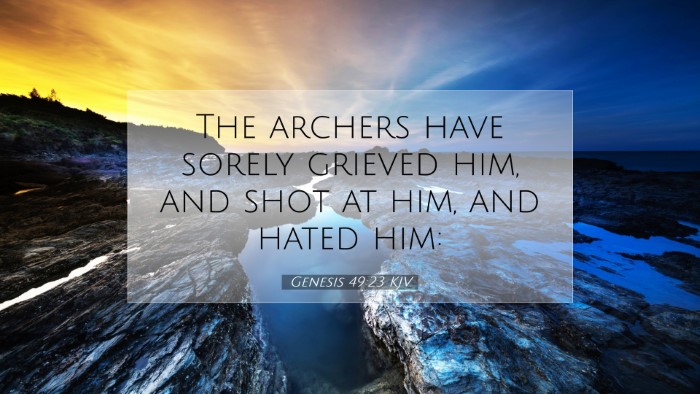Commentary on Genesis 49:23
Text of Genesis 49:23: “The archers have sorely grieved him, and shot at him, and hated him.”
This verse comes from Jacob's prophetic blessing on his sons, particularly focusing on Joseph. It is a poignant expression of the suffering Joseph endured, which serves both as a historical account and a prefiguration of the trials of the righteous.
Contextual Background
In Genesis 49, Jacob gathers his sons to declare what will befall them in the days to come. This segment of his discourse focuses on Joseph, who symbolizes resilience amidst adversity. Understanding the historical context of Joseph's life—his journey from favored son to a slave, and ultimately to a ruler in Egypt—illuminates the depth of this verse.
Analysis and Insights
1. The Language of Suffering
The phrase “the archers have sorely grieved him” invokes imagery of battle and conflict. According to Matthew Henry's Commentary, the “archers” signify not just physical adversaries but can be understood as those in Joseph's life who contributed to his suffering. His brothers' betrayal symbolizes inner familial conflict. Thus, archers represent both visible foes and the emotional wounds inflicted by those who are supposed to stand by us.
2. The Nature of Opposition
Albert Barnes interprets the phrase “shot at him, and hated him” as highlighting the intensity and malice of Joseph’s attackers. This can be extended metaphorically to the trials faced by those who seek to live righteously. Barnes advocates that the societal contempt and deep-seated jealousy are recurrent themes within the lives of the faithful, as they often suffer as a result of their righteousness.
3. Symbolism in Joseph's Life
Adam Clarke emphasizes that Joseph’s suffering parallels Christ’s passion. Just as Joseph endured suffering for a greater purpose—to save his family from famine—so too did Christ endure suffering for the salvation of humanity. The hatred that surrounds him foreshadows the New Testament realities of Jesus’ ministry and ultimate sacrifice. This connection invites reflection on the idea that suffering can lead to divine purpose.
4. Suffering and Redemption
This verse encapsulates a critical biblical theme: the transformation of suffering into redemption. Joseph, despite being grievously wronged, rises to power through God’s provision. His adversities compel him into a position where he can save others. In a similar way, believers are called to understand that hardships may serve a greater divine plan. As noted by Henry, those who endure will eventually see the fruition of their struggles in divine blessings.
5. The Role of Faith
In reflecting on this passage, we also see a deepening understanding of faith amidst adversity. Jacob’s prophecy foreshadows future difficulties for his lineage but simultaneously reassures that divine intervention will prevail. This calls to mind the assurance found in Romans 8:28, where all things work together for good for those who love God. The mention of archers in this context prompts readers to consider their response to suffering: to remain steadfast in faith despite the attacks they might face.
Conclusion
Genesis 49:23 invites a multifaceted discussion on suffering, opposition, and redemption. It serves as a reminder for pastors, theologians, and students that trials can be windows into the broader narrative of God's faithfulness. The call is to interpret personal and communal suffering through the lens of divine purpose and, like Joseph, to navigate life's adversities with resilience and faith.
Reflective Questions
- How can we draw strength from Joseph's story in our own times of suffering?
- What does this verse teach us about the nature of familial conflict and reconciliation?
- In what ways can we recognize the "archers" in our own lives, and how should we respond to them?
- How does understanding suffering as part of God’s greater plan reshape our perception of our challenges?


